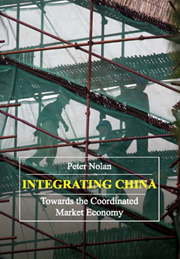Book contents
- Frontmatter
- Contents
- Acknowledgements
- Foreword
- 1 Reflections on 4th June 1989
- 2 The Global Business Revolution and Developing Countries
- 3 The Globalisation Challenge and the Catch-up of Developing Countries: The Case of the Brewing Industry
- 4 The Global Industrial Consolidation and the Challenge for China: The Case of the Steel Industry
- 5 China in the Asian Financial Crisis: ‘Cutting the Trees to Save the Forest’
- 6 China at the Crossroads
- 7 Capitalism and Freedom: The Contradictory Character of Globalisation
- 8 Capitalism, Conflict and Cooperation: US-China Relations under Capitalist Globalisation
- Index
7 - Capitalism and Freedom: The Contradictory Character of Globalisation
Published online by Cambridge University Press: 05 March 2012
- Frontmatter
- Contents
- Acknowledgements
- Foreword
- 1 Reflections on 4th June 1989
- 2 The Global Business Revolution and Developing Countries
- 3 The Globalisation Challenge and the Catch-up of Developing Countries: The Case of the Brewing Industry
- 4 The Global Industrial Consolidation and the Challenge for China: The Case of the Steel Industry
- 5 China in the Asian Financial Crisis: ‘Cutting the Trees to Save the Forest’
- 6 China at the Crossroads
- 7 Capitalism and Freedom: The Contradictory Character of Globalisation
- 8 Capitalism, Conflict and Cooperation: US-China Relations under Capitalist Globalisation
- Index
Summary
It was the best of times, it was the worst of times, it was the age of wisdom, it was the age of foolishness, it was the epoch of belief, it was the epoch of incredulity, it was the season of Light, it was the season of Darkness, it was the spring of hope, it was the winter of despair, we had everything before us, we had nothing before us…
(Charles Dickens, A Tale of Two Cities)Introduction: Humanity at the Crossroads
Since ancient times the exercise of individual freedoms has been inseparable from the expansion of the market, driven by the search for profit. This force, namely capitalism, has stimulated human creativity and aggression in ways that have produced immense benefits. As capitalism has broadened its scope in the epoch of globalisation, so these benefits have become even greater. Human beings have been liberated to an even greater degree than hitherto from the tyranny of nature, from control by others over their lives, from poverty, and from war. The advances achieved by the globalisation of capitalism have appeared all the more striking, when set against the failure of non-capitalist systems of economic organisation.
However, capitalist freedom is a two-edged sword. In an epoch of capitalist globalisation, its contradictions have intensified. They comprehensively threaten the natural environment. They have intensified global inequality within both rich and poor countries, and between the internationalised global power elite and the mass of citizens rooted within their respective nations.
- Type
- Chapter
- Information
- Integrating ChinaTransition into Global Economy, pp. 177 - 230Publisher: Anthem PressPrint publication year: 2007

